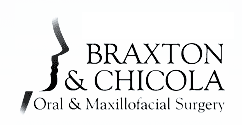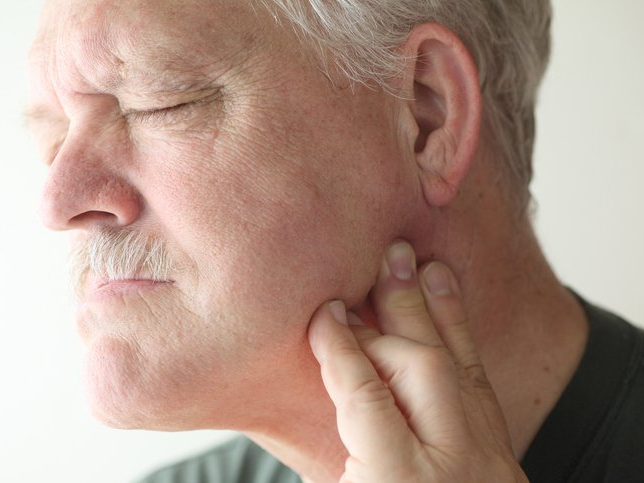TMJ Disorders
TMJ (TEMPOROMANDIBULAR JOINT)
TMJ (TemporoMandibular Joint) disorders are a family of problems related to your complex jaw joint. If you have had symptoms like pain or a “clicking” sound, you’ll be glad to know that these problems are more easily diagnosed and treated than they were in the past. These symptoms occur when the joints of the jaw and the chewing muscles (muscles of mastication) do not work together correctly. TMJ stands for Temporomandibular Joint, which is the name for each joint (right and left) that connects your jaw to your skull. Since some types of TMJ problems can lead to more serious conditions, early detection and treatment are important.
No single treatment can predictably resolve all TMJ disorders, and all treatment modalities typically take some time to become effective. As Board Certified Oral and Maxillofacial Surgeons, we can help you have a healthier and more comfortable jaw through the application of a variety of both surgical and non-surgical therapies.
WHY DOES MY JAW HURT?
TMJ disorders develop for many reasons. You might clench or grind your teeth, tightening your jaw muscles and stressing your joint. You may have a damaged jaw joint due to injury or disease. Injuries and arthritis can damage the joint directly or stretch or tear the supporting ligaments. As a result, the disk, which is made of fibrocartilage and functions as the “cushion” of the jaw joint, can slip out of position. Whatever the cause, the results may include a misaligned bite, pain, or a clicking or grating noise on opening, or trouble opening your mouth wide.
DO YOU HAVE A TMJ DISORDER?
- Are you aware of grinding or clenching your teeth?
- Do you wake up with sore, stiff muscles around your jaws?
- Do you have frequent headaches or neck aches?
- Does the pain get worse when you clench your teeth?
- Does stress make your clenching and pain worse?
- Does your jaw click, pop, grate, catch, or lock when you open your mouth?
- Is it difficult or painful to open your mouth, eat or yawn?
- Have you ever injured your neck, head or jaws?
- Have you had problems (such as arthritis) with other joints?
- Do you have teeth that no longer touch when you bite?
- Do your teeth meet differently from time to time?
- Is it hard to use your front teeth to bite or tear food?
- Are your teeth sensitive, loose, broken or worn?
The more times you answered “yes,” the more likely it is that you have a TMJ disorder. Understanding TMJ disorders will also help you understand how they are treated.
TREATMENT
There are various treatment options that we can utilize to improve the harmony and function of your jaw. Once an evaluation confirms a diagnosis of TMJ disorder, we will determine the proper course of treatment. It is important to note that treatment always works best with a team approach of self-care combined with professional care. The initial goals are to relieve muscle spasms and joint pain. This is usually accomplished with a pain reliever, anti-inflammatory, and/or muscle relaxant. Steroids can be injected directly into the joints to reduce pain and inflammation. Self-care treatments can often be effective as well and include:
- Resting your jaw
- Keeping your teeth apart when you are not swallowing or eating (i.e. not clenching)
- Eating soft foods
- Applying ice and/or heat
- Exercising your jaw
- Practicing good posture
Stress management techniques such as biofeedback or physical therapy may also be recommended, as well as a clear plastic appliance known as a bite splint. A splint or nightguard fits over your top or bottom teeth and helps keep your teeth apart, thereby relaxing the muscles and reducing pain. There are different types of appliances used for different purposes. A nightguard helps you stop clenching or grinding your teeth, reduces muscle tension at night, and helps to protect the cartilage and joint surfaces. An anterior positioning appliance moves your jaw forward, relives pressure on parts of your jaw and aids in disk repositioning. Appliances may also help protect the teeth from excessive wear in those prone to tooth grinding.
WHAT ABOUT BITE CORRECTION OR SURGERY?
If your TMJ disorder has caused problems with how your teeth fit together, you may need treatment such as bite adjustment (equilibration), orthodontics with or without jaw reconstruction, or restorative dental work. Surgical options such as arthroscopy and open joint repair are sometimes needed, but are reserved for severe cases. We do not typically recommend “open joint” surgery for TMJ disorders unless the jaw can’t open, is dislocated and nonreducible, has severe degeneration, or the patient has been unsuccessful with a full range of more conservative therapies.




